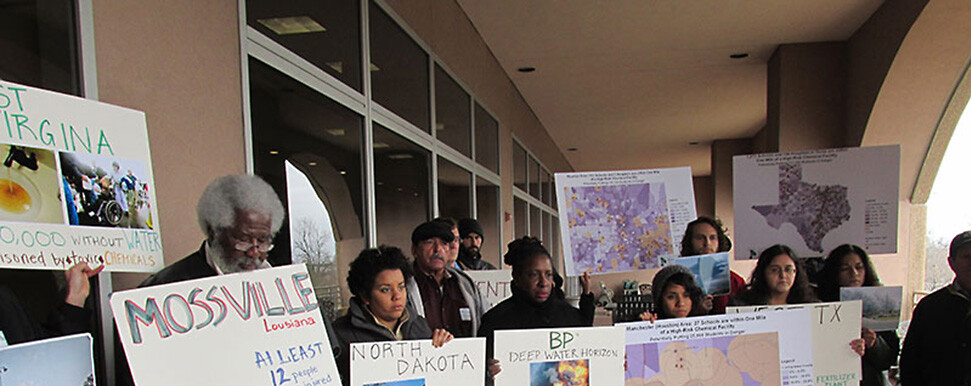
Media
November 1, 2013Chemical Disasters: EPA Holds Meeting in Texas to Hear from Communities
Contact: Stephenie Hendricks, (415) 258-9151, shendricks@comingcleaninc.org
(Houston, TX) EPA is holding a "listening session" about the threat of chemical disaster and health hazards for communities living near chemical plants on Tuesday, November 5th, 8am in Texas City. The session is one of several prompted by the explosion in West,Texas and other areas.
On August 1st, President Obama issued an executive order requiring three federal agencies to coordinate their activities to propose new policies that will significantly enhance the safety and security of thousands of chemical facilities across the U.S. The "listening sessions" are aimed at gathering information from those most impacted by chemical hazards.
"Workers are injured and killed by chemical plant explosions almost every week in this country. President Obama's executive order to prioritize protections from chemical disasters must hold corporations accountable for the safety of their workers and the communities where they do business," comments Diane Wilson, from Texas Injured Workers who will be attending the listening session.
"It is about time for citizens and communities in harm's way to be protected from incidents that are preventable. We spend too much time and resources on protecting the industries and have consequently sacrificed the lives of innocent citizens, both on the job site and off the premises of the facilities," says Juan Parras of Texas Environmental Justice Advocacy Services (t.e.j.a.s), who will be at the Texas City session. "People are already sick from chemical plant emissions who are living near the Houston ship channel. When you add explosions - which happen on a regular basis - it's like living in a war zone. Children here have the highest rates of asthma. Families struggle with higher rates of cancer and other illness."
"Benzene, and breakdown products like dioxin, are commonly emitted into the air in communities here in Texas. When an explosion happens, even more toxic chemicals contaminate the areas. It's crucial that we tell EPA how toxic and dangerous it is to be living near these plants," says Neil Carman, PhD, from the Lone Star Chapter of the Sierra Club.
Jeff Kaplan, owner of New Living in Houston, adds,"More and more consumers and businesses are rejecting the use of toxic chemicals in their products. But here in Houston, the air and water can be filled with dangerous chemicals from explosions, and we have no choice. President Obama has to make a strong plan to protect the communities and businesses from the dangers of chemical plants that have been built in these neighborhoods."
Since the explosion in West, Texas and the government shutdown, there have been several chemical accidents across the country that have caused injuries and deaths. Every day, more than 100 million people in the U.S. live and work in the shadow of chemical facilities that store tons of hazardous chemicals with the potential to kill or injure thousands of workers and community residents; 473 of these facilities each put more than 100,000 or more people at risk. Safer, cost-effective chemicals and processes are widely available, and hundreds of facilities have already switched, but only a fraction of the highest-risk facilities have voluntarily converted.
Additional Resources
Coalition to Prevent Chemical Disasters
Coming Clean Workgroup for Environmental Justice
Maps of High Risk Facilities Near Schools and Hosptials in Texas
More listening sessions for President Obama’s Executive Order 13650
February 17, 2014: Baton Rouge, LA
